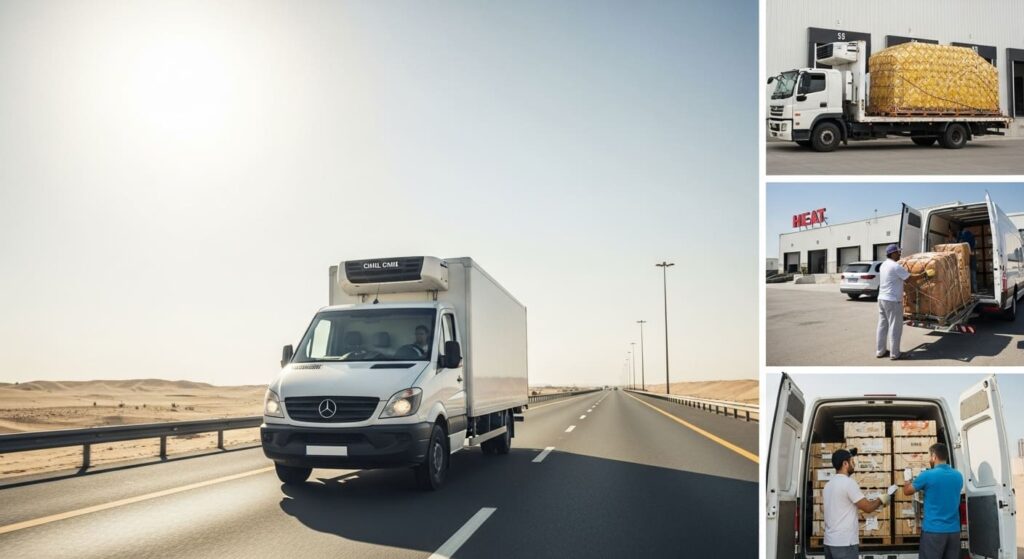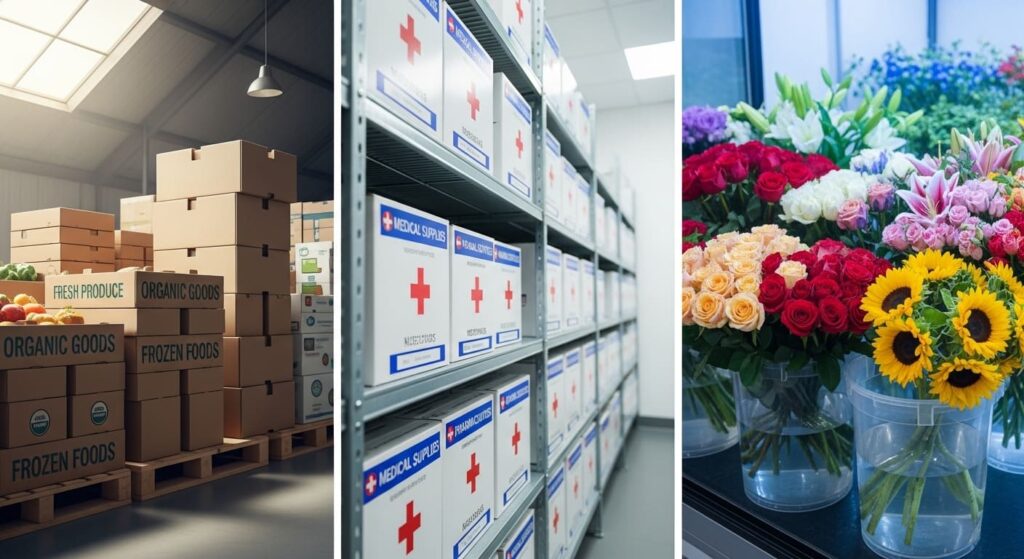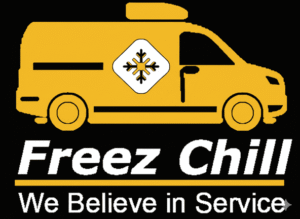
A single delivery delay in the UAE’s heat can ruin an entire shipment. Meat spoils, flowers wilt, vaccines lose effectiveness, and your business absorbs the cost.
This is why the uses of refrigerated vans go far beyond keeping products cold. They safeguard your reputation in a climate where temperatures regularly climb above 45°C and road conditions vary across long transport routes.
Reliable cold-chain delivery is now essential for restaurants, supermarkets, clinics, e-commerce providers, and any business handling temperature-sensitive goods.
When cooling systems fail or the wrong type of refrigerated vehicle is used, the financial and operational impact can be immediate.
So how do you protect your cargo from these risks? It starts with understanding the role refrigerated vans play in UAE logistics and knowing which transport solution fits your needs.
Why Uses Of Refrigerated Vans Are Essential in the UAE

Maintaining product integrity in the UAE requires more than quick transport. You need vehicles built to handle extreme temperatures, long routes between Emirates, and strict safety standards for items like food and pharmaceuticals. Here’s what makes refrigerated vans indispensable across the country.
Meeting UAE Temperature-Control Challenges
Daily temperatures of 40–50°C make uncontrolled transport a major risk. Heat rapidly accelerates spoilage, alters product composition, and reduces shelf life.
A vehicle that sits just ten minutes in the sun can trap heat that damages cargo before the journey even begins.
Refrigerated vans stabilize temperatures from the moment they’re pre-cooled to the time cargo is offloaded. Consistent cooling prevents warm air pockets and protects items like dairy, seafood, and medical supplies.
What does that mean for your business? Products arrive fresh, safe, and compliant, even during peak summer hours.
Let’s break that down: reliable temperature ranges prevent melt, bacterial growth, and chemical degradation, giving you predictable quality every trip.
Supporting Diverse Industries with Sensitive Cargo

Many UAE sectors depend on refrigerated transport for daily operations.
The food industry relies on chilled vehicles to move produce between Emirates. Pharmacies and clinics use freezer vans for vaccines that require narrow temperature ranges.
Florists need cooling to preserve delicate petals during long-distance deliveries. Even cosmetics companies use refrigerated vans to protect heat-sensitive formulas.
Real-world scenarios show the impact: catering teams delivering meals for a desert event, clinics receiving temperature-controlled injections,
and supermarkets distributing perishable items to branches across Dubai and Abu Dhabi. When each shipment depends on precise cooling, Uses Of Refrigerated Vans become a core part of business continuity.
Common Uses of Refrigerated Vans Across UAE Industries
Every sector that handles perishable, sensitive, or regulated products relies on refrigerated vans for safe transport. Below are the most common applications and why they matter.
Food and Beverage Distribution
The UAE’s food sector moves thousands of tons of perishables every day. Meat, poultry, dairy, baked goods, and frozen items all require strict temperature stability. Even a brief rise in heat can cause bacterial growth, off-flavors, or structural damage in products.
Uses Of Refrigerated Vans allow suppliers to deliver across Dubai, Sharjah, and Abu Dhabi without compromising freshness.
Here’s what really matters: peak delivery hours coincide with the hottest times of the day, making reliable cooling essential.
Whether stocking restaurants or fulfilling supermarket orders, controlled transport keeps the supply chain running smoothly.
Restaurant and Catering Transport
Catering teams face one of the toughest logistics challenges in the region. Events often occur outdoors, and dishes must arrive fresh, safe, and at the correct temperature.
Consider the scenario of delivering more than 200 prepared meals to a beach event during midday heat — without a chilled van, the risk is too high.
Refrigerated vans protect both raw and cooked foods while enabling large-scale event operations.
They also help restaurants meet strict food handling standards during peak service hours. This level of reliability keeps clients satisfied and prevents costly re-cooking or last-minute delays.
Supermarket and Grocery Deliveries
Supermarkets operate with tight delivery schedules and high reliance on temperature-sensitive goods.
Frequent restocking across multiple branches means they need both chiller vans for produce and freezer vans for frozen foods.
With long distances between Emirates, the temperature drop inside the van must be consistent from warehouse to shelf.
A well-maintained refrigerated van prevents thawing, melting, or moisture buildup. So how can you prevent transport losses? Choose the right van type and ensure temperature checks throughout the journey.
Pharmaceutical and Medical Transport
Medicines and vaccines follow strict temperature requirements, often between 2°C and 8°C. Any deviation can make the product ineffective.
UAE regulatory bodies such as MOHAP and DHA require documentation and controlled handling for pharmaceutical deliveries (Source:).
Uses Of Refrigerated Vans designed for medical transport offer stable cooling, insulated interiors, and monitoring systems that track temperature throughout the route.
Clinics and hospitals rely on this precision, especially for last-mile deliveries and urgent medical shipments.
Florists and Horticulture Transport
Flowers may look delicate, but their sensitivity to heat is one of the highest among transported goods. High temperatures can cause rapid wilting, discoloration, and reduced vase life.
Refrigerated vans allow florists to move arrangements and live plants across cities without damage.
Controlled cooling keeps stems hydrated and prevents the accelerated decay common in summer months. This ensures event planners, retail shops, and bouquet services receive consistent quality.
Cosmetics and Specialty Products
Many beauty products contain oils, fragrances, and formulas that degrade in heat. Perfumes can oxidize, creams can separate, and chemicals can destabilize when exposed to high temperatures. Refrigerated transport ensures these items retain their intended quality.
For cosmetics brands and distributors, this means fewer returns, fewer product defects, and improved customer satisfaction.
E-Commerce Cold Deliveries
Cold-chain e-commerce is growing across the UAE. Consumers now order fresh produce, frozen meals, seafood boxes, and ready-to-cook kits online.
These items demand consistent cooling until the moment they reach the customer’s doorstep.
Refrigerated vans with GPS tracking and temperature monitoring provide real-time transparency to both the business and the buyer.
This builds trust and ensures quality, especially for fast-growing meal kit and farm-to-door services.
Types of Refrigerated Vans and Choosing the Right One
Not all refrigerated vans serve the same purpose. Choosing the wrong type can damage cargo or increase operational costs. Here’s how to match van type to product needs.
Chiller Vans
Chiller vans maintain temperatures between 0°C and +5°C. These vehicles are ideal for items that require cooling but not freezing. Think dairy, drinks, pastries, fruits, and vegetables.
The cooling system ensures stable humidity and airflow, preventing moisture buildup. Chiller vans help businesses maintain freshness during frequent urban deliveries, especially in cities like Dubai where demand shifts quickly throughout the day.
Freezer Vans
Freezer vans operate at −18°C and below. They support frozen meats, ice cream, seafood, and pre-frozen packaged goods.
Consistent freezing is essential because even small temperature variations can cause thaw–refreeze cycles, leading to spoilage.
For businesses supplying hotels, supermarkets, and home delivery services, freezer vans ensure that frozen goods maintain structural and nutritional integrity.
Deep-Freezer Vans
These vans maintain ultra-low temperatures much colder than standard freezer vans. They’re used for specialized goods such as biological samples, certain pharmaceuticals, and high-value frozen imports.
Deep-freezer vans offer reinforced insulation and heavy-duty cooling units, making them suitable for long-distance routes where temperature deviation is not acceptable.
Partitioned or Multi-Temperature Vans
Multi-temperature vans are fitted with dual compartments, each operating at different cooling levels. This setup allows businesses to transport frozen and chilled items at once.
An example: dairy in one section and frozen seafood in another. For companies managing mixed loads or multi-stop routes, this option increases efficiency while maintaining safety.
Factors When Choosing a Refrigerated Van
- Required temperature range
- Type of cargo
- Delivery distance and duration
- Compliance and documentation requirement
Best Practices for Safe and Efficient Temperature-Controlled Transport
A reliable refrigerated van is only part of the solution. Maintaining transport safety requires proper loading, monitoring, and operational discipline throughout the journey.
Pre-Cooling Vehicles Before Loading
A refrigerated van must reach the target temperature before loading. Warm air trapped inside the cabin can compromise the cargo quickly.
Pre-cooling stabilizes conditions so the product enters a controlled environment from the start.
This step is critical for frozen goods that cannot tolerate exposure to warm air. It also supports compliance with food safety standards for HACCP-certified operations.
Proper Loading Techniques
Cargo placement affects airflow. Obstructed vents or tight stacking can create warm pockets and uneven cooling. Insulated crates and proper spacing help maintain a stable environment.
Let’s break that down: keeping airflow unobstructed supports consistent temperature and reduces the risk of spoilage during longer trips.
Monitoring Temperature Throughout the Trip
Digital thermometers, telematics, and onboard tracking systems allow real-time temperature readings. These tools help drivers catch fluctuations early.
For businesses transporting pharmaceuticals or frozen foods, monitoring creates documentation that supports regulatory compliance and protects against disputes.
Minimizing Door Open Time
Heat rushes into the cabin every time the door opens. Drivers should plan deliveries to reduce unnecessary stops and keep openings brief.
So how can you prevent heat spikes? Train staff to load quickly, open doors in shaded areas when possible, and avoid backtracking routes.
Route Planning for UAE Roads
Road congestion can extend delivery times and expose cargo to risk. Planning routes that avoid peak heat hours or heavy traffic ensures smoother transport.
Well-structured scheduling helps businesses maintain delivery windows and reduces stress on cooling units.
Maintaining HACCP and UAE Compliance
Food businesses must follow HACCP guidelines and UAE food transport standards (Source:). This includes maintaining consistent temperatures, proper documentation, and safe handling practices.
Refrigerated vans that meet these standards help companies maintain audit readiness and reduce compliance risks.
Regular Vehicle Maintenance
Refrigeration units require frequent checks to ensure consistent performance. Regular servicing prevents breakdowns and reduces operating costs over time.
A reliable maintenance schedule is especially important during summer months when cooling units work at full capacity.
Training Staff for Cold-Chain Handling
Drivers and handlers must understand safe loading, temperature checks, and hygiene requirements. Training ensures that human errors don’t compromise the cargo.
This strengthens your cold-chain reliability and supports smoother day-to-day operations.
Common Mistakes to Avoid
- Overloading the van
- Ignoring temperature fluctuations
- Choosing the wrong van type for specific cargo
Conclusion
Refrigerated vans are essential for protecting product quality, meeting UAE safety standards, and ensuring smooth delivery across all business sectors.
Whether you manage food, pharmaceuticals, flowers, or specialty imports, the right temperature-controlled transport keeps your goods safe and your reputation strong.
By choosing the right van type and following cold-chain best practices, you minimize risk and boost customer confidence in every delivery.
For dependable refrigerated, chiller, and freezer van rentals in the UAE, trust Freezchill, your partner in reliable cold-chain logistics.

